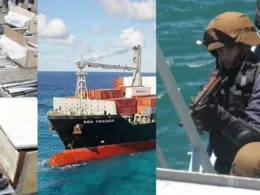By Luca Jahier, President of the European Economic and Social Committee
For a continent with nearly 1.3 billion inhabitants, Africa has so far been relatively spared by the COVID-19 pandemic, with roughly 6000 cases – mostly in South Africa and Algeria – and 200 deaths at the time of writing. The worst is, alas, still to come.
Last week, the COVID-19 virus reached two countries at war: Libya and Mali. Some countries have started containment, such as Algeria, South Africa and Rwanda. Others have declared a state of emergency and are restricting the movement of people, including Senegal and the Democratic Republic of the Congo (DRC).
But social distancing is practically impossible in cramped slums, as is hand-washing when running water is a luxury. The growing number of urban-dwellers – now nearly half of Africa’s population – will find it more difficult not to go to work when they need money to survive. More measures will be needed and lessons should be learned from past outbreaks, such asthe 2014 Ebola crisis. African countries must waste no time and be aggressive in testing, tracing and isolating cases.
As the number of infections rises, Europe cannot lose sight of the damage that #Coronavirus will have on the African economy, which will surely outweigh its medical impact. Western governments will step in to prop up domestic businesses, but few African governments have those kinds of resources available to adopt economic stimulus packages.
The welfare of a billion people depends on how governments balance saving lives from the virus while minimising economic damage in a continent where more than 400 million people live on less than 2 euro a day. More than 80% of African exports go to the rest of the world, and about half of these are raw materials, whose prices have plummeted. Tourism has collapsed. Remittances could also soon drop. I could go on with the grim outlook.
Europe needs to adopt a #whateveritakes strategy for Africa too, stepping up humanitarian, social and economic aid. It is in our mutual interest and is fully aligned with the new EU-Africa strategy proposed only a few weeks ago – strategy that will need to be revised to take into account the major challenges raised by CODIV-19, while other key policy instruments such as a post-Cotonou Agreement and the African Continental Free Trade Area will likely be delayed.
Several African politicians and experts have been vocal on the danger ahead for the continent and have called on the international community to respond appropriately to this unprecedented global pandemic.
EU High Representative Josep Borrell has promised that Europe will not forget its sister continent when addressing the pandemic, which in the words of Commissioner Jutta Urpilainen couldbounce back to Europe and the rest of the world if nothing is done to help Africa.
Europe is well placed to strengthen the humanitarian response by opening trade corridors, especially for preventive health and medical supplies, food and immediate upgrades to health infrastructure, making sure health workers have enough protective equipment, are trained and can work in a safe environment.
A few days ago, the UN launched a $2 billion coordinated global humanitarian response plan to fight COVID-19 in some of the world’s most vulnerable countries. I am glad to see that the response plan will be implemented by UN agencies, together with civil society organisations such as international NGOs and NGO consortia.
Similarly, the G20 leaders have committed to a coordinated global response and undertaken “to do whatever it takes to overcome the pandemic” to protect lives and livelihoods, restore confidence and shore up stability, currently threatened, in trade and other sectors. They also understood that it was in everybody’s collective interest for Africa sat centrally within a strategy in terms of health, economic and employment response to plan humanity’s global-scale COVID-19 fightback.
Doing #whateverittakes for Africa also means listening to Ethiopian prime minister Abiy Ahmed who called for a solid global fund to prevent the collapse of health systems, economies and (where it already exists) democratic stability in Africa.
The idea of injecting $1 trillion in liquidity in the form of Special Drawing Rights from the International Monetary Fund (IMF) and a contribution in hard currency is welcome. Equally welcome is the idea of mobilising another $1 trillion by adopting a “jubilee” on the debt of the countries in particular difficulty, in the form of a suspension of repayment of these countries’ debts followed by a significant reduction in that debt.
Europe needs to play its role with conviction and work with Africa to set the agenda for its recovery, otherwise other players, such as China, are likely to dictate the future and come back to hit us like a boomerang.









Join our Channel...